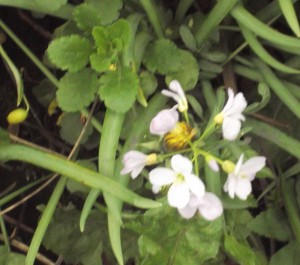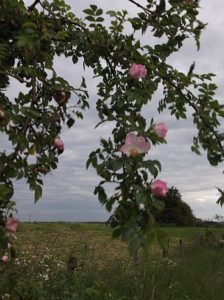
This is not really a typical month, as it has certainly not been the territory of rain. There hasn’t been any serious rain all month, and not much in March. The pond is low and I’m already watering things that I wouldn’t usually need to worry about until June. On the other hand, until last weekend, it wasn’t really cold, so we have had a beautiful month, with blossom – the cherry coming a good fortnight earlier, and the apple just opening. Daffodils and primroses weren’t battered by winds, and the wind anemones flourishing and spreading.

The cow parsley is just beginning on the road verges, along with white dead-nettle and garlic mustard – the first time I’ve seen it here, and the bluebells are out. Soon it will be time to go to Inchmahome, where the bluebells are like a flood under the old chestnuts and oaks, and the geese will be nesting.
Migrant birds are back, though not in large numbers yet, and the dawn chorus is pretty impressive. We had on major disappointment, in that robins made a lot of progress on a nest just below my study window, but then abandoned it. They haven’t gone far, however, as I still see them foraging.
There have been some changes, most of them quite encouraging. Wrens chaffinches and gold-finches are about in greater numbers and there are more song-thrushes. There are more skylarks in the fields this year, but I haven’t seen any lapwings at all, nor heard a curlew. The biggest change is the lesser black-backed gull colony. The warehouse they used to nest on was demolished, and though a good number tried to nest among the rubble, they were disturbed by surveyors, and I saw no chicks at all. This year fewer gulls have come back, and only the boldest are on the site – which isn’t being developed at all yet. Some of them are on chimneys, and some of them must be on the river bank, but it seems awfully quiet without them.
The other change is the deer. Once the sight of a deer coming down from the crags was a rare thing, but now you can see them browsing in the fields furthest from the road almost every day. As the human community begins to struggle with our social and environmental pressures, some quiet resurgence may be beginning among our neighbours. I’m taking all the hopeful signs I can get!


